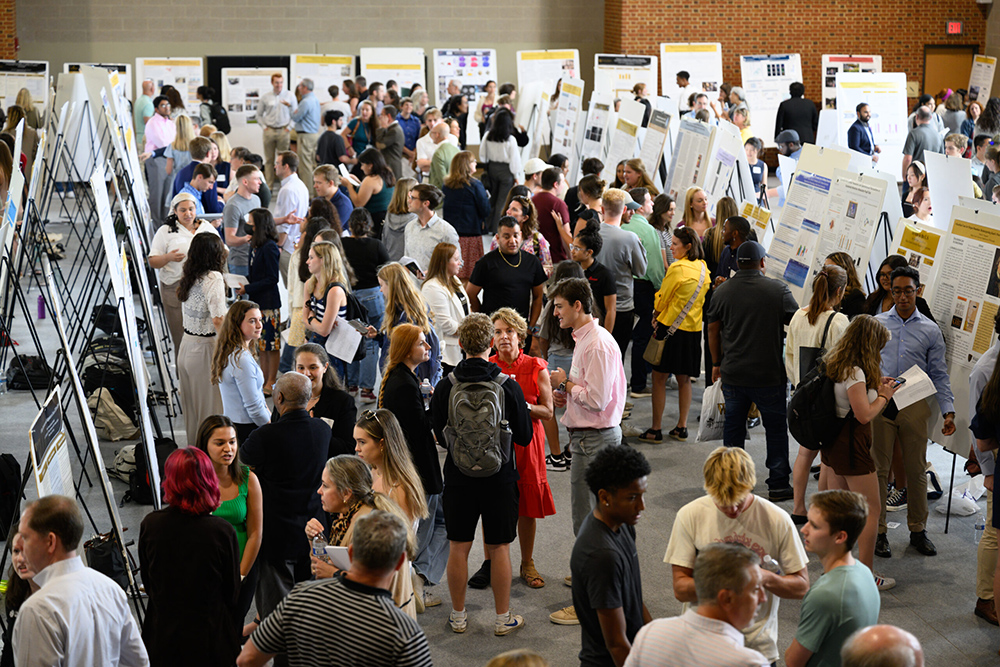Neuroscience Minor
The neuroscience minor provides an interdisciplinary approach to the study of the nervous system. Neuroscientists study how we learn, process and remember information from the molecular to the philosophical level, and examine subjects ranging from the molecular pharmacology of brain function to the mind-body problem.
Requirements
- The minor requires a minimum of seventeen hours, nine of which must include the Neuroscience courses (200, 201, 300) described below.
- At least one semester of research in neuroscience is required for the minor (NEU 391). The research can be conducted on the Reynolda campus or with investigators at the Wake Forest University Medical School.
- The research project must be approved by a member of the Neuroscience Minor faculty.
- Eight hours must come from the elective courses listed below. (See course descriptions under appropriate listings.)
- One of the elective courses must come from outside the student’s major department.
Neuroscience Courses
NEU 200. Introduction to Neuroscience. (3 hours) An interdisciplinary course taught by faculty representing several fields. Topics include neurophysiology, sensory biology, motor mechanisms, neuropharmacology, cognitive neuroscience, perception, neural networks and the philosophy of mind.
NEU 201. Neuroscience Laboratory. (1 hour) A laboratory course that will examine principles of neuroscience ranging from the molecular and cellular to the behavioral and cognitive. Lab – three hours. C – Neuroscience 200.
NEU 300. Neuroscience Seminars. (3 hours) Consideration of current neuroscience topics. Presentations of current research by faculty on the Reynolda Campus or the Wake Forest University School of Medicine. Readings from the primary literature will accompany the presentations. P-Neuroscience 200.
NEU 391. Research in Neuroscience. (2 hours) Supervised independent laboratory investigation in neuroscience.
Elective Courses
(8 hours minimum)
- BIO 323………….Animal Behavior (4 hours)
- BIO 324………….Hormones and Behavior (3 hours)
- BIO 343………….Molecular Neuroscience (3 hours)
- BIO 346………….Neurobiology (4 hours)
- BIO 352………….Developmental Neuroscience (4 hours)
- BIO 354………….Methods in Neuroscience (3 hours, 4 hours in Salamanca)
- BIO 353………….Functional Neuroanatomy (3 hours)
- BIO 364………….Sensory Biology (3 or 4 hours)
- BIO 374………….Neuropharmacology (3 hours)
- EDU 311…………Learning & Cognitive Science (3h)
- HES 312…………Exercise and Health Psychology (3 hours)
- HES 350…………Human Physiology (3 hours)
- LIN 330…………..Introduction to Psycholinguistics and Language Acquisition (3h)
- NEU 301-304…Topics in Neuroscience
- PHI 374………….Philosophy of Mind (3 hours)
- PSY 243…………Biopsychology (3 hours)
- PSY 248…………Cognitive Psychology (3 hours)
- PSY 317………….Special Topics in Experimental Psychology (3 hours)-Salamanca
- PSY 320…………Physiological Psychology (3 hours)
- PSY 322…………Psychopharmacology (3 hours)
- PSY 323…………Animal Behavior (3 hours)
- PSY 326…………Learning Theory and Research (3 hours)
- PSY 329…………Perception (3 hours)
- PSY 331…………Research in Cognitive Psychology (3 hours)
- PSY 333…………Motivation of Behavior (3 hours)
- PSY 338…………Emotion
- PSY 348………..Clinical Neuroscience
- Note: Many of these courses have prerequisites, in some cases including introductory biology, psychology or chemistry.



